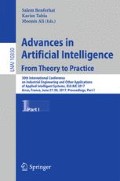Abstract
The continuous rapid growth of electronic Arabic contents in social media channels and in Twitter particularly poses an opportunity for opinion mining research. Nevertheless, it is hindered by either the lack of sentimental analysis resources or Arabic language text analysis challenges. This study introduces an Arabic Jordanian twitter corpus where Tweets are annotated as either positive or negative. It investigates different supervised machine learning sentiment analysis approaches when applied to Arabic user’s social media of general subjects that are found in either Modern Standard Arabic (MSA) or Jordanian dialect. Experiments are conducted to evaluate the use of different weight schemes, stemming and N-grams terms techniques and scenarios. The experimental results provide the best scenario for each classifier and indicate that SVM classifier using term frequency–inverse document frequency (TF-IDF) weighting scheme with stemming through Bigrams feature outperforms the Naïve Bayesian classifier best scenario performance results. Furthermore, this study results outperformed other results from comparable related work.
Access this chapter
Tax calculation will be finalised at checkout
Purchases are for personal use only
References
INternet World Stats: Internet World Users by Language. Top 10 Languages. http://www.internetworldstats.com/stats7.htm
Al-Kabi, M., Al-Qudah, N.M., Alsmadi, I., Dabour, M., Wahsheh, H. (eds.): Arabic/English Sentiment Analysis: An Empirical Study (2013)
Agarwal, B., Mittal, N.: Prominent Feature Extraction for Sentiment Analysis. Springer, Cham (2016)
Farghaly, A., Shaalan, K.: Arabic natural language processing: challenges and solutions. TALIP 8, 1–22 (2009)
Ray, S.K., Shaalan, K.: A review and future perspectives of arabic question answering systems. IEEE Trans. Knowl. Data Eng. 28, 3169–3190 (2016)
Bani-Khaled, T.A.: Standard Arabic and Diglossia. A problem for language education in the Arab world. Am. Int. J. Contemp. Res. 4, 180–189 (2014)
Siddiqui, S., Monem, A.A., Shaalan, K.: Towards improving sentiment analysis in Arabic. In: Hassanien, A.E., Shaalan, K., Gaber, T., Azar, A.T., Tolba, M.F. (eds.) Proceedings of the International Conference on Advanced Intelligent Systems and Informatics 2016, pp. 114–123. Springer, Cham (2017)
Refaee, E., Rieser, V.: An Arabic Twitter Corpus for subjectivity and sentiment analysis. In: Proceedings of the Ninth International Conference on Language Resources and Evaluation (LREC-2014), Reykjavik, Iceland, 26–31 May 2014, pp. 2268–2273 (2014)
Shaalan, K.: A survey of Arabic named entity recognition and classification. Comput. Linguist. 40, 469–510 (2014)
El-Makky, N., Nagi, K., El-Ebshihy, A., Apady, E., Hafez, O., Mostafa, S., Ibrahim, S.: Sentiment analysis of colloquial Arabic Tweets (2015)
Al-Twairesh, N., Al-Khalifa, H., Al-Salman, A.: Subjectivity and sentiment analysis of Arabic: trends and challenges. In: 2014 IEEE, Doha, Qatar, 10–13 November 2014, pp. 148–155. IEEE, Piscataway (2014)
Abdulla, N.A., Ahmed, N.A., Shehab, M.A., Al-Ayyoub, M. (eds.): Arabic sentiment analysis: Lexicon-based and corpus-based. In: 2013 IEEE Jordan Conference on Applied Electrical Engineering and Computing Technologies (AEECT) (2013)
Duwairi, R.M., Qarqaz, I. (eds.) Arabic sentiment analysis using supervised classification. In: 2014 International Conference on Future Internet of Things and Cloud (FiCloud) (2014)
Shoukry, A., Rafea, A.: Sentence-level Arabic sentiment analysis. In: International Conference on Collaboration Technologies and Systems (CTS), 21–25 May 2012, Denver, Colorado; Proceedings, pp. 546–550. IEEE, Piscataway (2012)
Aly, M., Atiya, A.: LABR: large scale arabic book reviews dataset. In: Meetings of the Association of Computational Linguistics (ACL) (2013)
Abdul-Mageed, M., Diab, M.T.: AWATIF: a multi-genre corpus for modern standard arabic subjectivity and sentiment analysis and evaluation. In: Calzolari, N., Choukri, K., Declerck, T., Dogan, M.U., Maegaard, B., Mariani, J., Odijk, J., Piperidis, S. (eds.) Proceedings of the Eighth International Conference on Language Resources and Evaluation (LREC-2012), Istanbul, Turkey, 23–25 May 2012, pp. 3907–3914. European Language Resources Association (ELRA) (2012)
Rushdi-Saleh, M., Teresa, M.-V.M., Ureña-López, A.L., Perea-Ortega, J.M.: OCA: opinion corpus for Arabic. J. Am. Soc. Inf. Sci. 62, 2045–2054 (2011)
Zaidan, O.F., Callison-Burch, C.: The Arabic online commentary dataset: an annotated dataset of informal Arabic with high dialectal content. In: Proceedings of the 49th Annual Meeting of the Association for Computational Linguistics: Human Language Technologies: short papers, vol. 2, pp. 37–41. Association for Computational Linguistics, Portland, Oregon (2011)
Shoukry, A., Rafea, A.: Preprocessing Egyptian Dialect Tweets for sentiment mining. In: Fourth Workshop on Computational Approaches to Arabic, AMTA 2012, pp. 47–59 (2012)
Shoukry, A., Rafea, A.: A hybrid approach for sentiment classification of Egyptian Dialect Tweets. In: Gelbukh, A., Shaalan, K. (eds.) Advances in Arabic Computational Linguistics. First International Conference on Arabic Computational Linguistics: ACLing 2015, 17–20 April 2015, Cairo, Egypt: Proceedings, pp. 78–85. IEEE, Piscataway (2015)
Rushdi Saleh, M., Saleh, R., Martín-Valdivia, M.T., Montejo-Ráez, A., Ureña-López, L.A.: Experiments with SVM to classify opinions in different domains. Expert Syst. Appl. 38, 14799–14804 (2011)
Author information
Authors and Affiliations
Corresponding author
Editor information
Editors and Affiliations
Rights and permissions
Copyright information
© 2017 Springer International Publishing AG
About this paper
Cite this paper
Alomari, K.M., ElSherif, H.M., Shaalan, K. (2017). Arabic Tweets Sentimental Analysis Using Machine Learning. In: Benferhat, S., Tabia, K., Ali, M. (eds) Advances in Artificial Intelligence: From Theory to Practice. IEA/AIE 2017. Lecture Notes in Computer Science(), vol 10350. Springer, Cham. https://doi.org/10.1007/978-3-319-60042-0_66
Download citation
DOI: https://doi.org/10.1007/978-3-319-60042-0_66
Published:
Publisher Name: Springer, Cham
Print ISBN: 978-3-319-60041-3
Online ISBN: 978-3-319-60042-0
eBook Packages: Computer ScienceComputer Science (R0)

